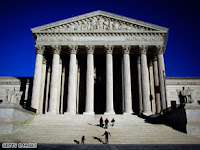The Democratic president said the commissions would be restarted  as an option for trying prisoners at the U.S. military base in Cuba after undergoing several rule changes, including barring statements made under harsh interrogation and making it more difficult to use hearsay evidence.
as an option for trying prisoners at the U.S. military base in Cuba after undergoing several rule changes, including barring statements made under harsh interrogation and making it more difficult to use hearsay evidence.
"These reforms will begin to restore the commissions as a legitimate forum for prosecution, while bringing them in line with the rule of law," said Obama, who opposed the law that created the tribunals during the administration of his Republican predecessor, President George W. Bush.
"He (the president) is determined to reform the military commissions as an available form, along with the federal courts, for prosecution of detainees at Guantanamo," Pentagon spokesman Bryan Whitman told reporters.
Republicans welcomed the move. Senate Republican leader Mitch McConnell called it an "encouraging development." Obama's presidential rival John McCain said it was a step toward a comprehensive detainee policy that "accords with our values and protects our national security."
RIGHTS GROUPS CRITICAL
Rights groups, which have been long been critical of Washington's treatment of foreign terrorism suspects and the use of the detention center at Guantanamo Bay, condemned the decision.
"By resurrecting this failed Bush administration idea, President Obama is backtracking dangerously on his reform agenda," said Kenneth Roth, head of Human Rights Watch.
Amnesty International accused Obama, who took office in January, of breaking a major campaign promise.
"These military commissions are inherently illegitimate, unconstitutional and incapable of delivering outcomes that we can trust. Tweaking the rules of these failed tribunals so that they provide 'more due process' is absurd," said Anthony Romero of the American Civil Liberties Union.
The decision was the second in less than a week to anger Obama's liberal supporters. Earlier this week, he reversed a previous decision and announced he would seek to prevent the release of photographs showing alleged abuse of prisoners, saying the images could endanger U.S. troops abroad.
White House spokesman Robert Gibbs, asked at a briefing if Obama was worried about alienating his most loyal supporters, defended the decisions.
"Look, first and foremost the president of the United States is going to do what he believes is in the best security interests of the people of the United States," he said.
Obama has promised to close Guantanamo Bay prison by 2010. The prison was set up in 2002 at the U.S. base on the southeastern tip of Cuba to house foreign prisoners in the U.S. war on terrorism that Bush declared after the hijacked plane attacks on the United States on September 11, 2001.
Gibbs said the decision to proceed with military commissions would not block the closure, but the administration was working to determine where the tribunals could be held once Guantanamo closes. He also indicated some prisoners would be shifted to the U.S. court system.DEATH SENTENCES POSSIBLE
Among those facing trial at Guantanamo are self-described September 11 mastermind Khalid Sheikh Mohammed and four co-defendants who could be executed if convicted of nearly 3,000 murder charges stemming from the plane attacks.
When he took office in January, Obama ordered a four-month freeze on Guantanamo court proceedings to give him time to decide whether to move the prosecutions into the regular U.S. civilian or military courts or keep the special tribunals.
The freeze order had been seen as a death knell for the Guantanamo war crimes court, which has completed only two full trials since the detention camp opened.
The administration asked on Friday for a delay in the court proceedings to allow time for the new rules to take effect. The rule changes must be shown to Congress 60 days before they go into force.
"The secretary of defense will be sending to Congress several changes to the rules for military commissions," Whitman said.
He said the rule changes included:
- A ban on using statements obtained during cruel or inhumane interrogation
- A rule making it more difficult to use hearsay evidence
- Greater latitude for the accused to choose a defense counsel
- More protections for a defendant who refuses to testify.
U.S. authorities on Friday also released a Guantanamo Bay detainee who was part of a landmark Supreme Court case that granted inmates at the U.S. military prison the legal right to challenge their confinement, officials said.
The detainee, Algerian national Lakhdar Boumediene, was released from custody and flown from the U.S. Navy base to waiting relatives in France, said officials, who spoke on condition of anonymity.










